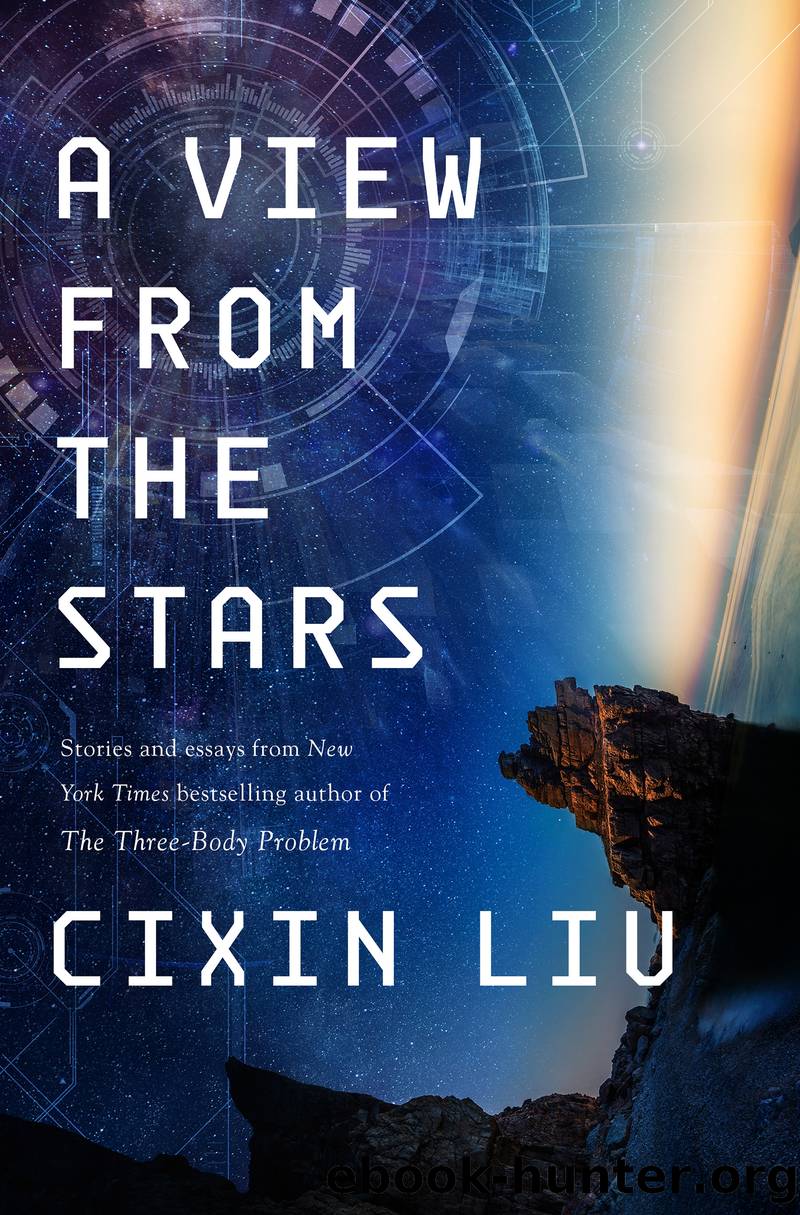A View from the Stars by Cixin Liu

Author:Cixin Liu
Language: eng
Format: epub
Publisher: Tor Publishing Group
CIVILIZATIONâS EXPANSION IN REVERSE
TRANSLATED BY ADAM LANPHIER
Written September 14, 2001, at Niangzi Pass
First published in Science Fiction World, 2003, no. 2
When the alien civilization that generations have dreamed of, have called out for, have soughtâwhen that civilization finally comes to Earth, humankind may find itself faced with an uncomfortable situation that has never occurred to it, even in its dreams: The aliens might ignore our welcoming, outstretched hands, choosing instead to embrace and converse with the ants.
This raises a question weâve never seriously considered:
Whoâs the Earthâs head of household?
If you take it for granted that we are, youâll find youâre deluding yourself: It hasnât been much more than a million years since we climbed down from the trees, and the oldest civilization whose legacy we can realistically claim as our own arose just five thousandâodd years ago. Hundreds of millions of years ago, ants were already forging their great empires on each of Earthâs ancient continents. Compared to them, weâre nothing but homeless orphans whoâve just wandered into the room and asked for a cup of water. Weâre nowhere near head-of-household level.
Youâll no doubt protest: Thatâs ancient history! We have civilization, and human civilization is what raises Earthâs standing in the universe.
Yet so far, at least, the evidence hasnât proven that. We think of the Late Cretaceous, with its asteroid impact and the subsequent extinction of most life on Earth, including the dinosaurs, as the most horrific period in the history of life on this planet. What you might not know, however, is that species are going extinct at a much faster rate now, in the Era of Civilization, than they did at the end of the Cretaceous. The most horrific period in the history of life on this planet is now! Civilization might be the path of light by which life perpetuates through the generations ⦠or it might be a trap, a one-way road to the extinction of all life, ours included.
The defining feature of modern, technological civilization is its tendency toward expansion. Civilization constantly extends its borders, growing in scale as if it were a balloon being blown up, without a thought as to when it will pop.
Consider the Age of Exploration, full of desire and passion at sea. In that short era, European civilization, roused from sleep by the Renaissance, spread like a swarm of locusts to every corner of the globe.
As for whatâs ahead: If civilization manages to persist, it will by necessity expand in scale indefinitely and become an enormous macrocivilization. Sci-fi writers have offered many vivid depictions of such superscale civilizations. Larry Nivenâs Ringworld, for instance, depicts an enormous structure encircling a star that such a civilization has constructed; in Asimovâs Foundation series, humans have spread throughout the whole of the Milky Way; and in Clarkeâs 2001: A Space Odyssey, the supercivilization makes use of a hyperspace structureâa thing beyond humanityâs capacity ever to understandâthat in effect turns the entire universe into their backyard.
But what weâre writing is science fiction; if weâre to
Download
This site does not store any files on its server. We only index and link to content provided by other sites. Please contact the content providers to delete copyright contents if any and email us, we'll remove relevant links or contents immediately.
Sita - Warrior of Mithila (Book 2 of the Ram Chandra Series) by Amish(54852)
The Crystal Crypt by Dick Philip K(36854)
Cat's cradle by Kurt Vonnegut(15328)
Always and Forever, Lara Jean by Jenny Han(14887)
Ready Player One by Cline Ernest(14634)
The Last by Hanna Jameson(10246)
Year One by Nora Roberts(9782)
Persepolis Rising by James S. A. Corey(9348)
The remains of the day by Kazuo Ishiguro(8968)
Never let me go by Kazuo Ishiguro(8874)
Red Rising by Pierce Brown(8756)
Dark Space: The Second Trilogy (Books 4-6) (Dark Space Trilogies Book 2) by Jasper T. Scott(8169)
The handmaid's tale by Margaret Atwood(7751)
The Circle by Dave Eggers(7103)
Frank Herbert's Dune Saga Collection: Books 1 - 6 by Frank Herbert(7054)
The Testaments by Margaret Atwood(6878)
Legacy by Ellery Kane(6649)
Pandemic (The Extinction Files Book 1) by A.G. Riddle(6528)
Six Wakes by Mur Lafferty(6236)
